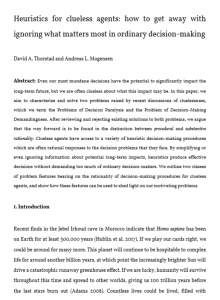Heuristics for clueless agents: how to get away with ignoring what matters most in ordinary decision-making
David Thorstad and Andreas Mogensen (Global Priorities Institute, Oxford University)
GPI Working Paper No. 2-2020
Even our most mundane decisions have the potential to significantly impact the long-term future, but we are often clueless about what this impact may be. In this paper, we aim to characterize and solve two problems raised by recent discussions of cluelessness, which we term the Problems of Decision Paralysis and the Problem of Decision-Making Demandingness. After reviewing and rejecting existing solutions to both problems, we argue that the way forward is to be found in the distinction between procedural and substantive rationality. Clueless agents have access to a variety of heuristic decision-making procedures which are often rational responses to the decision problems that they face. By simplifying or even ignoring information about potential long-term impacts, heuristics produce effective decisions without demanding too much of ordinary decision-makers. We outline two classes of problem features bearing on the rationality of decision-making procedures for clueless agents, and show how these features can be used to shed light on our motivating problems.
Other working papers
In Defence of Moderation – Jacob Barrett (Vanderbilt University)
A decision theory is fanatical if it says that, for any sure thing of getting some finite amount of value, it would always be better to almost certainly get nothing while having some tiny probability (no matter how small) of getting sufficiently more finite value. Fanaticism is extremely counterintuitive; common sense requires a more moderate view. However, a recent slew of arguments purport to vindicate it, claiming that moderate alternatives to fanaticism are sometimes similarly counterintuitive, face a powerful continuum argument…
AI takeover and human disempowerment – Adam Bales (Global Priorities Institute, University of Oxford)
Some take seriously the possibility of AI takeover, where AI systems seize power in a way that leads to human disempowerment. Assessing the likelihood of takeover requires answering empirical questions about the future of AI technologies and the context in which AI will operate. In many cases, philosophers are poorly placed to answer these questions. However, some prior questions are more amenable to philosophical techniques. What does it mean to speak of AI empowerment and human disempowerment? …
How much should governments pay to prevent catastrophes? Longtermism’s limited role – Carl Shulman (Advisor, Open Philanthropy) and Elliott Thornley (Global Priorities Institute, University of Oxford)
Longtermists have argued that humanity should significantly increase its efforts to prevent catastrophes like nuclear wars, pandemics, and AI disasters. But one prominent longtermist argument overshoots this conclusion: the argument also implies that humanity should reduce the risk of existential catastrophe even at extreme cost to the present generation. This overshoot means that democratic governments cannot use the longtermist argument to guide their catastrophe policy. …

